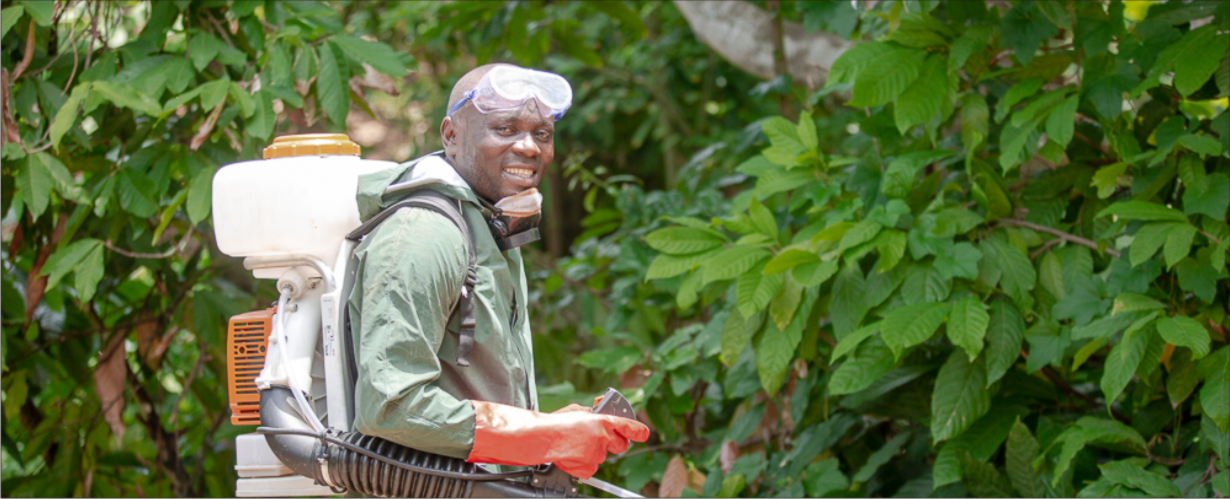

Grooming a wide range of support actors (called the service providers model) to sustainably offer technical and business support services tailored to the needs of the smallholder farmers and MSMEs on a commercial basis creates a more buoyant market. This is because it empowers the market actors to improve productivity, increase income, and create jobs – fostering prosperity and reducing poverty.
Donor projects can help market actors sustain their shared business benefits and respond to external shocks like COVID-19 by playing facilitator roles. The donor projects can do this in four (4) ways: facilitating an effective and mutually beneficial relationship between the market actors in the market systems; ensuring effective coordination between the local service providers; investing in market analysis to inform business actions; and promoting new communications media and channels to support more market-wide adoption of successful adaptive strategies.
Solar energy cabins can provide reliable, affordable, and sustainable electricity access to off-grid communities (riverine and land) that will unlock the innate entrepreneurial spirit found in many rural communities, create jobs, and increase incomes.
Energy cabins are community-centric energy access models that require social acceptance and adoption by the community. So, they must be human-centered in design to gain acceptance. They also must be operated by commercially motivated partners, driven by the demand and customer’s ability to pay to secure electricity supply.
They are deployable through flexible business models based on 100 percent investment from the power developer; 50:50 ownership between private energy investors and communities; or a community ownership arrangement involving a Design, Build, Operate and Transfer model.
These variable models localize and standardize the quality in design, installation, operations, and maintenance. And, therefore, it integrates an ecosystem of developers, contractors, and service suppliers that can facilitate growth and expansion in the sector.
PIND discovered these models after struggling from 2016 to 2018 to find a working and sustainable model of stimulating investments for achieving access to energy to off-grid communities in the Niger Delta.
Mainstreaming Gender & Social Inclusion
Deliberate actions must be taken to target and women, PWDs (people with disabilities), and other marginalized groups as program and project participants; otherwise, it will not happen. These groups need activities that improve their lives and livelihoods because the ecosystem is naturally skewed to exclude them.
More coordinated approaches and strategies are essential for sectors that demand gender-labor-market segregation and that only offer complex access for PWDs. PIND has facilitated gender and social inclusion into our programming by partnering with gender-based groups and organizations; designing and adapting intervention packages tailored to their needs; actively monitoring the outcomes using specialized indicators; and more.
Skills for Youth Employment
Youth employment can be fast-tracked by implementing a skills development package leading to formal waged employment or self-employment through dynamic entrepreneurship. Local organizations make excellent implementing partners for such skills development programs. They have stake in and knowledge of the viable sectors. So, they can easily facilitate training, mentorships, smooth transition into employment, and access to wider networks and opportunities for the trainees.
Four (4) important actions increase the chances of success of such a program: making it competency-based for specific occupations and skills set that are currently in demand as determined through a labor market assessment (so it is demand-driven, market-led, and based on data); adding soft skills to the technical skills training (so young people have the behavioral skills to help them to succeed in the marketplace); providing robust post-training support, such as business advisory services, market linkages and access to funding to help the entrepreneurial youth find their footing quickly in the business world; and leveraging the collective expertise of key players in the skills development ecosystem in the program design and delivery.
Using local peacebuilding structures promotes resilient stability instead of the short-term, little long-term impact produced by using the traditional military action, legislature, and inquiry panels for conflict mitigation.
This involves adopting a multi-stakeholder inclusive approach that: facilitates a network of community stakeholders mobilized for conflict mitigation across the Niger Delta; involves multi-stakeholder collaboration and partnership with the private sector, government, and NGOs involved in peace mediation and conflict resolution work; collaborates with existing community structures that support peacebuilding; focuses on conflict analysis and assessments; and prioritizes training for community peace actors.
The multi-stakeholder approach is made more effective by incorporating and utilizing EWER systems for conflict prevention. This approach should also include State and non-State actors as part of a systematic and multifaceted data collection process, information sharing, and verification.
Capacity Development of Local NGOs
Building strong institutional and technical capacities for local CSOs and BMOs to deliver improved services and access funding from multiple sources goes beyond training. Instead, it is a systematic process that incorporates a bouquet of mutually supporting interventions.
It entails developing capabilities through trainings on key technical, organizational development, and operational competencies. This is followed by direct technical advisory through in-house coaches and mentors to aid on the job learning, linkage to networks, connections, information, and providing financial, human, and technological resources assistance.
Partnership for Development
With partnerships, organizations combine their collective resources, capabilities, and technical expertise to significantly impact development. This is because no single organization can solve the complex and interconnected development challenges in the Niger Delta region.
By creating valuable opportunities to discuss, strategize, share expertise, and learn together, partners spur the resources, innovation, and creativity that unlocks long-term development solutions.

